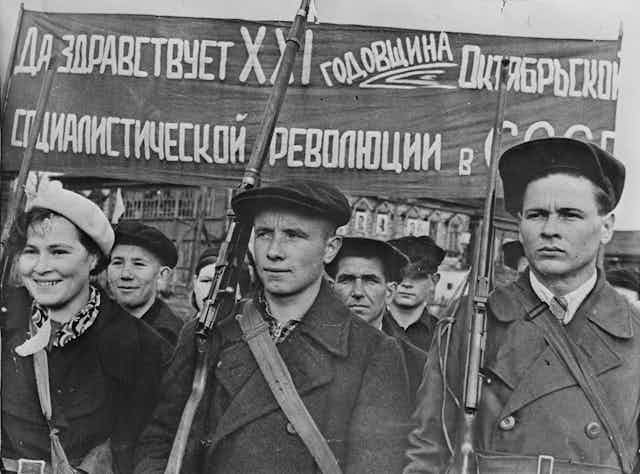In 1917, the British Labour party excitedly welcomed the February Revolution in Russia. Future party leader George Lansbury’s newspaper, the Herald, called Russia “a new star” which had “risen over Europe”. As a left-wing party, Labour was excited to see socialists and liberals now governing Russia.
The October Revolution was greeted with less enthusiasm, but interest in the Soviet experiment grew during the Russian Civil War as socialist Russia appeared to be under attack from international capitalism. Numerous visitors travelled to Russia to see things for themselves and to see what they could learn. They returned home and either wrote about how Lenin had successfully laid the foundations of socialism, or that he had crushed democracy and established a dictatorship of the Communist party. The discussions inspired by revolutionary Russia helped to sharpen the debates about the different routes to socialism between believers in parliamentary democracy and gradual reform, and advocates of a more radical approach who were inspired by the Moscow model.
Accepting Lenin
Lansbury visited Russia in early 1920 and wrote about his time there in What I saw in Russia. As a Christian socialist and pacifist, Lansbury was a surprising supporter of Bolshevik Russia. But he was willing to accept that Lenin was trying to create an alternative world based on socialist principles, even if they were different to his own socialist principles.
Lansbury praised Lenin’s “far reaching ability” and “whole hearted enthusiasm and devotion to the cause of humanity”. He claimed that there was no doubt about Lenin’s commitment to building socialism, as he “could not be thwarted or turned one side or the other by personal consideration of any kind”. Lansbury was not oblivious to Russia’s problems, and noted that hunger and disease were serious issues affecting the country. But he did not blame the Bolsheviks. Instead, the problems were caused by the foreign powers’ blockade of Russia during their intervention on the side of anti-Bolshevik forces. Lansbury went to Russia “as a socialist, to see what a socialist revolution looks like at close quarters”. He returned as a convinced defender of Soviet Russia.
A critical account
Christian socialist and Independent Labour party member Ethel Snowden also went to Russia in 1920 as part of a Labour/TUC union delegation. When she published her findings in Through Bolshevik Russia, she revealed that certain aspects of Soviet life annoyed her.

She complained that the Internationale was sung “whole or in part, exactly 17 times” at one public reception and that there was a tendency to go to bed at “the terribly un-English hour of two or three o’clock in the morning”. Snowden was, however, impressed with the Bolsheviks’ anti-alcohol campaign, which clamped down on public drinking. The lack of men and women “the worse for liquor” was a “commendable feature of social life in Russia”.
A left-wing critic of the new Russia, Snowden did not recognise the Bolshevik system as socialist. She had “read much of Lenin had written” and “disagreed very profoundly with most it”. She accepted that he and Trotsky had kept the government together “in circumstances of tremendous difficulty” but regretted the excessive force that was used in the name of socialism. For her, Lenin’s “firm belief in the necessity of violence for the establishment throughout the world of his ideals makes one doubt miserably”. She returned home greatly disappointed by what she had seen.
A balanced view
Trade unionist Walter Citrine visited Russia in 1925, a year before he took over as general secretary of the TUC. His politics were quite different to those of his hosts as he believed in the class struggle, not the class war. He accepted that the government faced “very real problems” but was willing to find positives in the developing Soviet state.
The social hardships and lack of political freedom disturbed Citrine. In his opinion, the trade unions were too close to the Communist party, and this meant that workers could not be represented properly by independent organisations. He also wrote about the “barefooted and badly clothed women”, the homeless children begging in the streets, and the “dingy sheds not much better than fowl houses” which housed Leningrad’s excavation workers.
However, at the same time Citrine could see the big picture that was unfolding in front of him and he was “enthused by Lenin’s picture of an electric republic, organised on such lines as would ensure to every citizen, however humble, the advantages of a planned economy, and the blessings of a modern civilisation”. Despite the obvious problems, Citrine generally supported the reorganisation of Russian society, if not the methods used to achieve it.
Revolutionary Russia divided opinion in the Labour party, and the eyewitness accounts of Soviet socialism – the wildly optimistic, the deeply pessimistic or the critically supportive – fed into the debates about how to construct a socialist Britain in an era that had to cope with the devastating legacy of World War I.
Labour had long discussed workers’ control, women’s rights and economic planning. Now Russia not only did the same, it also offered answers, albeit within a very different context to the one Labour operated in. Labour now made arguments in favour of state intervention and economic planning as both could fill gaps the free market left when there was a need but no profit to be made. And although Labour never followed the Moscow road, Soviet Russia inspired hope that an alternative future which furthered these causes was possible. And in a world of economic chaos and political turmoil, this hope became ever more important.

